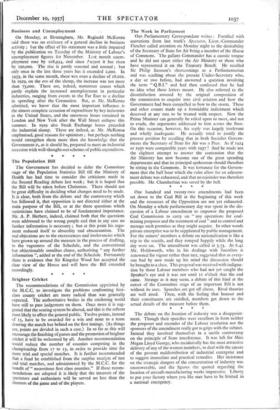Business and Unemployment .
On Monday, at Birmingham, Mr. Reginald McKenna said there was no evidence of a general decline in business activity.; but the effect of his statement was a little impaired by the- publication on Tuesday of the Ministry of Labour's unemployment figures for November. Ltst month unem- ployment -rose by 108,954, and since August it has risen by 190,000. The rise is partly seasonal and normal ; but only once in the last three years. has it exceeded 2,000. In 1933, in the same month,.there was even a decline of 18,000. In 1929, on the eve-of the slump, the increase was not more than 73,000. There are, indeed, numerous causes which partly explain the increased unemployment in particular industries, ranging from events in the Far East to a decline in spending after the Coronation. But, as Mr. McKenna admitted, we know that the most important influence is the almost complete cessation of expenditure by key industries in the United States, and the enormous losses sustained in London and New York after the Wall Street collapse this summer. In- 1929 also Stock Exchange losses preceded the industrial slump. There are indeed, as Mr. McKenna emphasised; good reasons for optimism ; but perhaps nothing would strengthen them more than the knowledge that the Government is, as it should be, prepared to meet an industrial recession with well-thought-out schemes of public expenditure.
* * * *






















































 Previous page
Previous page